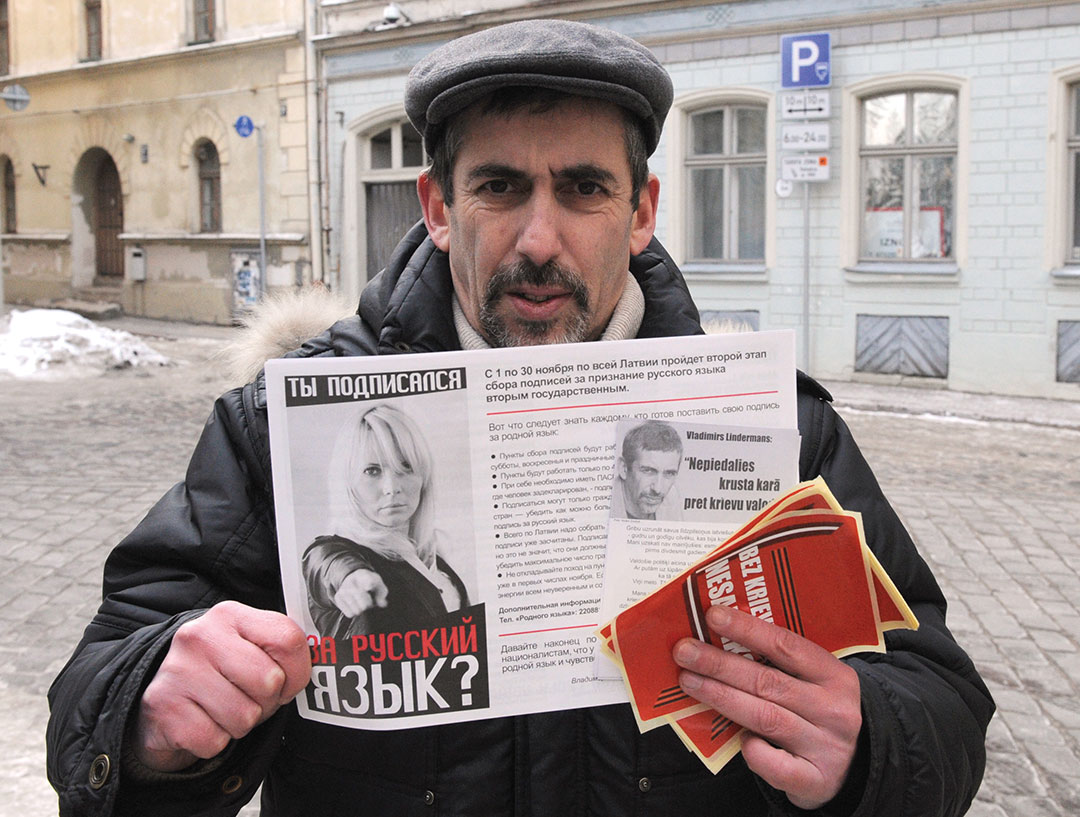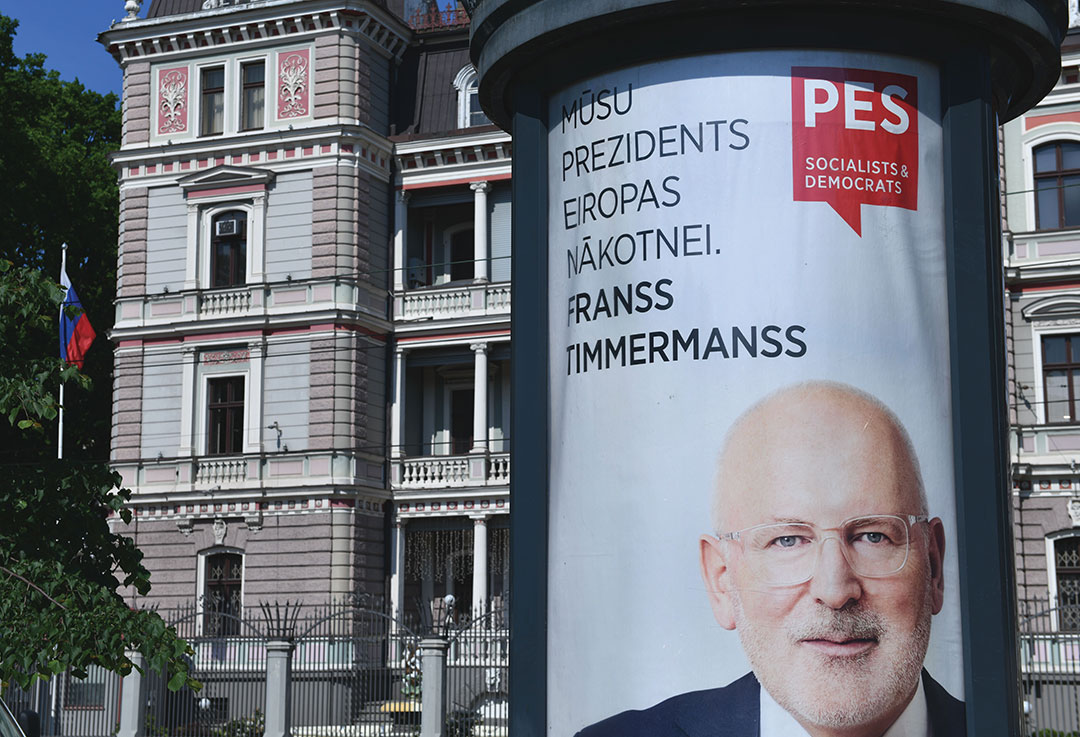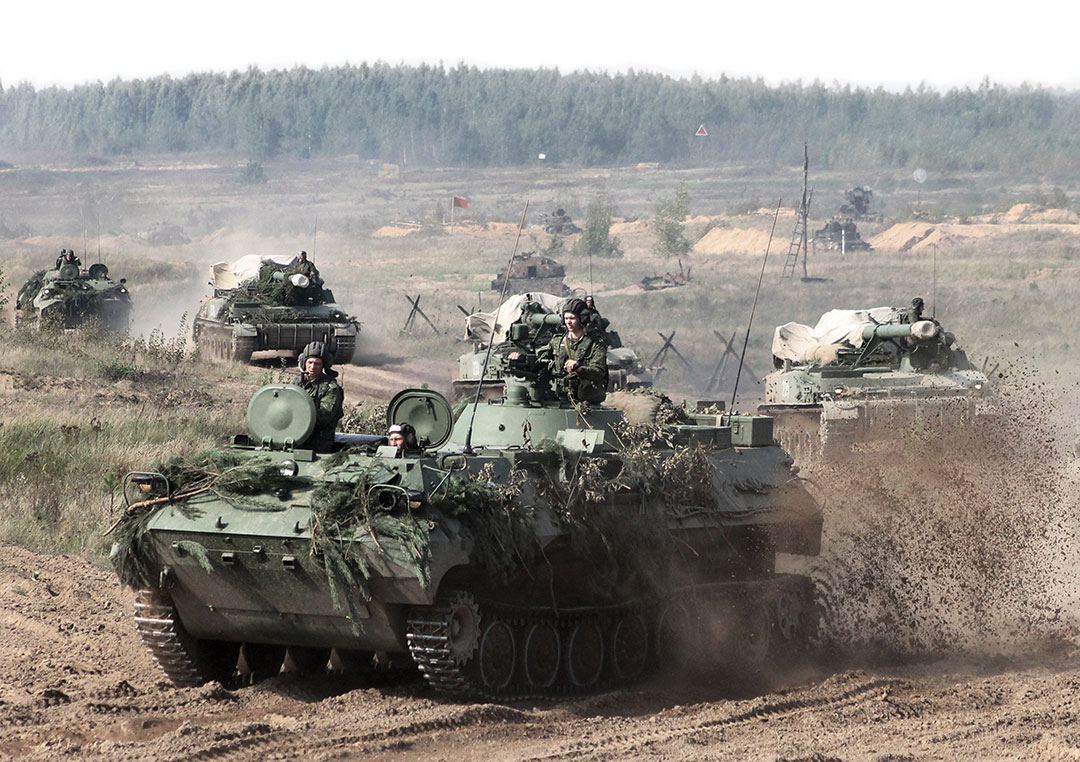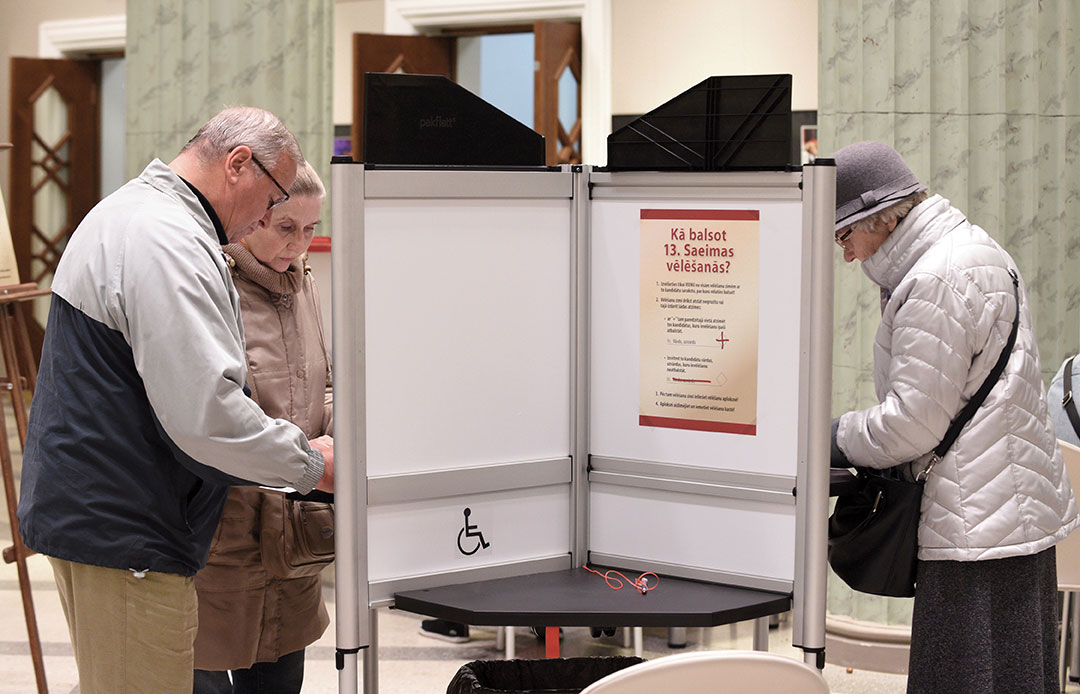Cross-domain coercion and Russia’s efforts to weaken NATO’s eastern flank
By Cmdr. Roslaw Jezewski, Polish Navy and national military representative at the Supreme Headquarters Allied Powers Europe
Russian President Vladimir Putin has said he wishes the Soviet Union had not collapsed. For Putin and many Russians, this was a geopolitical disaster that removed Eastern Europe from Russian hegemony. The fact that the Baltic countries and the states in the former Soviet zone of influence in east-central Europe now belong to NATO annoys the Russian leadership. The Kremlin has been bombarding them with fake news, accusing them of fascism and hoping to find a weak point in the structure of the Alliance. NATO’s eastern flank is not homogenous, especially when it comes to the Baltic states.
But which of the three countries is most vulnerable? A quantitative analysis of a few indexes helps to answer this question. The European Quality of Government Index for 2017, which focuses on the public’s perception of corruption and the quality of government services, ranks Estonia 90th among the 202 regions in Europe surveyed, Lithuania 114th, and Latvia 142nd. In another indicator, the Human Development Index, Estonia again is positioned best among the Baltic states (30th), followed by Lithuania (35th) and Latvia (41st). The same sequence was observed in two other indexes: the Social Justice in the EU Index for 2016 and the Social Cohesion Index for 2017. Several qualitative indicators help to explain Latvia’s rankings: 26% of the Latvian population is ethnic Russian, many residents are noncitizens, and the society is troubled and still recovering from the 2008 financial crisis. These factors make Latvia especially vulnerable to the security challenges posed by hybrid warfare techniques known as “new generation” warfare or cross-domain coercion, which aims to influence an adversary’s behavior through nonmilitary means.

Russia, which resents Latvia’s membership in NATO, attempts by all means below the threshold of active military hostilities to undermine the country’s stability and affect the cohesion of its population, hoping also to weaken NATO unity in the process. The National Security Concept, approved by Latvia’s government in 2015, recognizes that in this pursuit Russia will use coercion in all accessible domains, especially social, economic and military ones.
Examples of Russian coercion in Latvia are the derogatory propaganda from Russia-sponsored mass media, Russia’s live-fire drill within the Latvian Exclusive Economic Zone in April 2018, and the activity of Russia-based organized crime. These are difficult to counter because Russia seeks to undermine Latvian societal cohesion and stability without provoking a conflict that would create an Article 5 scenario. The employment of new-generation warfare techniques against Latvia will probably stop short of provoking conventional war. Russia prefers to employ “raiding tactics” against NATO that are cheap and efficient forms of warfare and that cross many domains (cyber, informational, financial), include infiltration and surprise attacks, leverage agility and help achieve the desired political results. This approach can successfully target every vulnerability in Latvian society, undermine the government’s credibility and weaken societal cohesion.
A significant vulnerability is the large share of ethnic Russians in the population. Many of them are noncitizens who are deprived of voting rights and cannot own property. This makes them vulnerable to Russian psychological operations (with Russian propaganda taking the lead) designed to convince them that Latvia does not protect their rights. A second vulnerability is Russia-based organized crime. It is suspected that organized crime organizations work in close cooperation with the Kremlin to launder money during covert operations against Latvia’s society and government. The scope and size of this threat is not publicly disclosed, but it has a profound effect on Latvian security. Third, the country faces grave social problems, such as income inequality, an aging population and emigration.
This qualitative study explores the questions: Is the Russian minority in Latvia a threat to the country’s cohesion? What is the impact of Russia-based organized crime on Latvia’s stability? Are there countermeasures that can be employed? To find the answers it is necessary to start with a survey, without which it would be difficult to determine the cohesiveness of Latvia’s population, the societal gaps and vulnerabilities. The survey assesses the susceptibility of the Latvian population to exploitation by Russian propaganda, the attitude of the Russian minority, and the threat perceptions of both Latvians and ethnic Russians.

Latvian vulnerabilities
Latvia’s population is estimated to be 1.95 million, with a labor force of slightly more than 1 million. Latvians represent 62% of the population, and Russians represent 25.4%, the country’s largest ethnic minority group. Many of the Russians live in the Latgale region in eastern Latvia and contribute to the presence of a Russian diaspora that dates from the Soviet-era occupation. Latvia identifies two major groups in the country: Latvian speakers and non-Latvian speakers. Among the Russian-speaking minority are ethnic Russians, Belarussians and others.
Inside the Russian minority there are about 242,000 noncitizens with relatively low status because of their poor command of the Latvian language and an inability to obtain good jobs. Latgale has a troubled economy, and available jobs are largely in the transportation or construction sectors. At the same time, Latvia is experiencing a serious demographic decline. Forecasts for 2060 suggest a population of only 1.2 million. An aging population and emigration, particularly among those under 30 years of age, are driving the decline. It is estimated that this intensive emigration will continue until at least 2030. There could be a negative impact on national security if adverse elements begin operating in depopulated areas.
The National Defence Academy of Latvia report, “The Possibility of Societal Destabilization in Latvia: Potential National Security Threats,” describes a divided society with people neither socially nor politically active and a serious distrust of the government. The 2016 report claims that participation in public issues is low. A summary of Latvian cohesion is supplied by the EU Social Justice Index 2017, which places Latvia 19th among the 28 European Union members (and last among the Baltic states). The education system, however, was rated well, though with caveats for an urban-rural quality gap and for the limited provisions for students with special needs.
The economy, despite positive trends, also has significant vulnerabilities. It is a small and open economy that is dependent on broader global trends. Business and development are focused on Riga, while the rest of the country remains underdeveloped. This is the reason why 30% of native Latvians declare their readiness to leave the country. There is significant disparity in the unemployment rate, with the lowest rate in Riga and the highest in Latgale. The percentage of elderly facing social exclusion is rising. These factors affect the whole Latvian population, and consequently the attitude of the Russian minority.
Ethnic Russian attitudes
Studies on the matter give the impression that the Russian minority is not a significant security threat; about 80% of Russian speakers declare loyalty to the nation, according to Aleksandra Kuczyńska-Zonik’s 2017 report in the Baltic Journal of Law & Politics. Additionally, the Russian diaspora is moderately integrated within Latvian society, although, according to James K. Wither in a 2018 Small Wars Journal article, there is antipathy toward active participation in the national defense system. The government’s anticipated language reform policy is also problematic and may create feelings of discrimination among ethnic Russians. However, half of noncitizens do not support Russian narratives, according to a National Defence Academy report, and the older generation expresses the greatest level of loyalty to Latvia because they enjoy life in Latvia compared to life in Russia. Nevertheless, a majority claims that they do not plan to obtain Latvian citizenship because of difficulties communicating in the Latvian language, easy travel to Russia (no visas are necessary) and, for some, plans to obtain Russian citizenship.
Interviews with ethnic Latvian representatives provide further insights. One expressed rather negative feelings toward noncitizens, claiming that their existence is a real problem for the country. According to the interviewee, these people love Russia but live in Latvia. Some have problems with alcohol and drugs, especially the younger generation (of noncitizens), and the older generation accuses the Latvian population of Nazism. But there was also a more positive side to the conversations. One interviewee said that much depends on parents in the noncitizen diaspora because there are examples of noncitizens trying to learn the Latvian language and integrate with society. Another Latvian representative stated that those noncitizens wanting to emigrate to Russia had already gone, and that the majority of the remaining ethnic Russians had no plans to leave. Older people feel some sentiment toward Russia, but only because of their ethnicity. They definitely do not want to emigrate, especially to Russia, because they know that the living conditions in Russian do not compare favorably with those in Latvia.
There are also noncitizens who act against Latvia and create problems for national security because they can be used as tools by the Kremlin. Analysis by the NATO Centre of Excellence in Riga demonstrates that Russia remains a trusted source of information for minorities in the Baltic states. A 2017 report by the Latvia Security Police paints an alarming picture of Russian Latvians involved in Russia’s information campaigns targeting Latvia’s internal problems. This part of the Russian minority may be leveraged by Russia to exploit Latvia’s internal vulnerabilities. The Latvian Security Police have already warned hostile pro-Russian activists about their behavior. One tool of provocation may be Russia-based organized crime, which has penetrated the Russian diaspora and is directly connected to the Kremlin.
Research concerning the perception of the threat to Latvia’s security from the Russian minority proved surprising. In Latgale, for example, 78% of people who speak the Latgalian dialect claim they would support Latvia against Russian aggression. According to a Latvian government official, they are ready to fight for Latvia’s freedom if necessary. For the Latvian population as a whole, the biggest threat is not Russia but the troubled domestic situation (low wages, declining population, inefficient health care system, corruption and crime). As for the interviewees, all consider Russia a threat. They also expressed a belief that Russia could attack without warning. Latvia’s National Security Concept lists Russia as the main threat to Latvia’s national security. Other parts of that document outline the ways cross-domain coercion or hybrid warfare methods aim to gradually weaken the country.
Based on these insights, it is possible to conclude that the Russian diaspora in Latvia is not homogenous. It differs in its opinion of the government and has different perspectives regarding the threat to national security. Therefore, this issue requires further study, including further interviews because the current posture of noncitizen and compatriot diasporas are not well-reflected in the literature. This can also be said of the presence of Russia-based organized crime.

How Russia can weaponize Latvian society
Latvia’s National Security Concept addresses the ways countries try to influence the unity of Latvian society. Russia uses a hybrid warfare strategy known as “raiding,” an easy and effective alternative to expensive and dangerous conventional warfare methods. In the information sphere, raiding coerces the enemy by shaping public perception. As in every aggression, the intruder targets an opponent’s center of gravity. And in Latvia, that center is likely to be public perception. Derogatory messages penetrating the Latvian information space try to create a positive image of Russia in the eyes of the Russian minority and to undermine trust toward the Latvian government. There is music, there is culture — and in between there are fake news and lies; one example is the lie that Latvia was not occupied by Russia.
Russian media find it easy to raid the Latvian information sphere, which hosts media in the Latvian and Russian languages. TV, radio and troll farms targeting social media transmit Russia’s soft power messages. Russia is playing on national sentiment in Russian minority populations to influence the domestic and foreign policies of neighboring countries. According to the NATO Strategic Communications Centre of Excellence, “the (alleged) violation of the human rights of Russia’s compatriots abroad may be used as justification for the violation of sovereignty, as was the case during the war with Georgia and crisis in Eastern Ukraine.” If Russia wants to provoke unrest in a country, the Russian minority could be a very useful tool.
Latvia’s Constitution Protection Bureau emphasized the danger in 2016, warning that “Russia’s influence in Latvia’s information environment still constitutes one of the most important long-term threats to the security of the Latvian state.” Russia’s broadcasts target all vulnerabilities that exist within society and use any pretext to get their messages across. In this stream of messaging, Russia presents itself as the defender of old sentiments, criticizes NATO and Latvia’s language policy, and repeats offers to grant Russian citizenship and pensions for compatriots. It is especially directed toward the part of the population that only consumes Russian-language media. In 2015, a survey by Latvia’s National Defence Academy found that “46% of Russian speakers do not obtain any information from the Latvian language media. … Approximately one-fifth of Latvian society cannot be reached through media in the state language.”
However, easy access to the Latvian media space does not guarantee victory for Russia in the information war. A survey by NATO’s Centres of Excellence clearly shows that Russia’s efforts are not as effective as they have hoped since “national media in the surveyed countries is perceived as more trustworthy … [than] the Russian media outlets.” For example, 54% of respondents to a 2017 survey disagree with the statement that Russian-speaking people in Latvia are being discriminated against. In addition, 45% fully disagree with the statement, “NATO is a threat to Russia.” It means that the audience makes judgments about Russian broadcasting and compares it to other sources.
The potential weaponization of Latvian society is not limited to the information sphere, according to the Centres of Excellence. Russia has been searching for countries or regions with poor governance to gain influence through corruption. Heather Conley, in the book The Kremlin Playbook: Understanding Russian Influence in Central and Eastern Europe, writes that this process is at the forefront of new generation warfare, which tends to influence a system, penetrate it and weaken it from inside. Russia then pumps its influence inside the country through established economic connections and tries to capture the state and amend national decisions. A 2018 Reuters article reported on suspected Russian money kept in the Latvian banking system and used to interfere in the internal affairs of European countries. The financial assets were reportedly delivered from Russia and used to finance hybrid activities that undermine political systems in other countries. Also in 2018, Bloomberg reported on suspicious Russian financial transactions in Latvia between 2010 and 2014, and on a significant flow of Russian deposits into Latvia beginning in 2012.
Even more alarming is a plot confirmed by Finland’s security services in 2018. According to these reports, ethnic Russians (some with double nationality) were buying or constructing expensive houses in southwest Finland close to vital communication routes and security installations. According to some accounts, military surplus fast boats were purchased, and there were frequent helicopter flights between Finland and Latvia. It prompted Finland to consider measures that would reduce the ability of foreigners to buy land or property in Finland. Similar measures should be introduced in Latvia, where it is possible to gain five-year permanent residency by fulfilling one of three conditions: buying property, making investments or opening a bank account. Special attention should also be paid to the Russian indoctrination of young ethnic Russians living in Latvia, which is taking place in paramilitary camps inside Russia. These are the places that infect young brains with propaganda. Russia’s investment in the younger generations may one day result in pro-Russian leaders in Latvia.
In response to Russian aggression, Latvia strives to unite the nation into a cohesive society able to repel adversarial actions. It is official national policy that it is the “duty of each citizen to defend their country and to resist an aggression in an active or passive manner.” Apart from Latvian uniformed formations, the core of the deterrence system is the presence in Latvia of NATO units, which conduct exercises as a show of force to demonstrate NATO’s commitment. According to Latvia’s Ministry of Defence, at the national level, deterrence capabilities are based on the potential to “rapidly increase the extent of the (regular armed forces) to the level required for the deterrence or warfare.” Does that mean one of the factors determining the resilience of Latvia’s defense system is the aging population? If the answer is “yes,” Latvia faces a problem. A report on the Defence Ministry website states: “the Baltic States face a common demographic challenge as efforts to expand the size and capacity of territorial forces may be thwarted by a shortage of young, skilled recruits, especially as seems likely, members of the large ethnic Russian minorities in Estonia and Latvia are unwilling to take part.”

Future implications
In the short term, the composition of the Latvian government will decide Latvia’s future. The elections in October 2018 brought an end to a coalition of right-wing parties. The pro-Russian Harmony party received about 20% of the vote. Of the two populist parties, KPV received 14%, and the New Conservative Party received slightly less than 14%. Support for Harmony does not mean that Latvia is turning toward Russia; the party has many Latvian members and public support is decreasing, from 28% in 2011 to slightly less than 20% in 2018. Therefore, the good news for the populist parties is that people simply grew tired of the scandals, corruption and the lack of progress.
In the long term, the demographic decline might hit Latvia the hardest. A decrease in the population could be catastrophic: Scarcely populated areas will become depopulated, and Latvia may turn into a country of old people and huge economic disparities. A lack of young people will also contribute to this gloomy picture: Who will work? Who will defend the country? These are the questions that the government, regardless of political orientation, will have to address. Is there any remedy for this trend? Most important is to restore the birthrate to at least 2.1 children per couple to sustain the population and reverse the emigration trend. The current Russian minority will probably integrate more into Latvian society simply because there is no other option, and the noncitizen diaspora will diminish due to mortality and the naturalization of the youth. This will require a tough but open stance by the Latvian government toward Russia to fight derogatory messaging and fake broadcasting. These efforts are on the way. In Latgale, where powerful Russian signals dominate the airwaves, Latvian TV stations are erecting transmitting stations and broadcasting Latvian-made Russian programs to address the eastern part of the country.
Conclusions
The Russian minority in Latvia — especially after the October 2018 elections — constitutes a base that Russia could use to undermine the country’s cohesion. However, this threat should not be overstated because the Russian minority is not homogenous; it contains pro-Latvians as well as pro-Russians. Also, the potential vulnerabilities in the Russian diaspora are not clear-cut. There are Latvian Russians with a clear understanding of the different living conditions in Latvia compared with Russia and who do not believe Russian propaganda or fake news. The Latgalians, especially, should not be perceived as a pro-Russian group; there are pro-Russian citizens and there are patriots who do not fear Russia and are ready to fight to defend Latvia. One thing must be clear, the Russian diaspora does not pose a threat for now. But if provoked from outside, perhaps by Russian coercion, the diaspora may react against Latvian society. Russia, if it decides to intervene in Latvia, will not do it to protect the diaspora, but will do it because of strategic choices, and the Russian minority will be just a tool to that end.
Russia-based organized crime may emerge as one of the most effective and covert means of coercion in Latvia. It has been deep inside Latvia since Soviet times and will be difficult to erase from society. Its existence should be analyzed together with its direct connection to the Kremlin, the Russian economic footprint and the problems affecting the Latvian banking system. It is likely that organized crime will be heavily involved in Russian attempts to incite unrest, bribe politicians and gather intelligence. Fighting this threat will require a national and international response.
Russia has been practicing extensive, hostile cross-domain coercion in Latvia for years, hoping to weaken the cohesion of NATO’s eastern flank. The most spectacular cases are the Zapad 17 exercise, cyber attacks, derogatory propaganda from state-owned TV stations, and the radicalization of ethnic Russian youth in training camps. These efforts may evolve into more aggressive measures, and direct warfare cannot be ruled out. The good news is that the self-esteem of the Latvian population is growing as people compare information from a wider range of sources and learn to identify fake news. This suggests that Russian propaganda is becoming an obsolete tool, and that Russia will try to engage through other domains. This would probably involve cyber operations, which are relatively cheap, effective and borderless.
Russia has been testing NATO’s eastern flank for years, a practice that can be expected to continue. Those efforts may now expand beyond the Baltic states to other “promising” targets. Divisions in society are also dangerous for Latvia’s national security. Social inequality is a serious obstacle to national cohesion. Distrust of the government is unfortunately justified in the face of corruption and social inequality, especially in rural areas. Societal gaps need to be eliminated as soon as possible because they work against the cohesion and resilience of Latvia.
There is evidence that, apart from money laundering, Russian organized crime is involved in espionage and intelligence gathering for the Russian government and is cooperating with criminal groups on the border. This means that despite the surprisingly positive resilience of the Russian diaspora in Latvia, Russia has an opportunity to infiltrate the country and exert cross-domain coercion from the inside. Other concerns that demand greater attention include the overall status of the Latvian population, cooperation with other Baltic states regarding Russian minorities, and the structure and characteristics of the Russian minority in Latvia.
Latvia’s case illustrates clearly that the cohesion and unity of a nation is of the utmost importance when opposing cross-domain coercion.


Comments are closed.